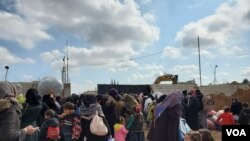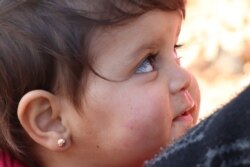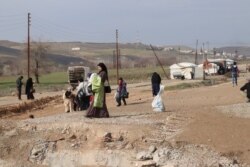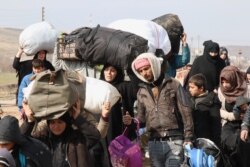It has taken eight hours for Ahmed, 32, and his three children to drive from Idlib, Syria, to the entrance to Manbij in a car packed with cousins, nieces and nephews. The streets were jammed with traffic at 3 a.m. because it was the safest time to flee the bombings in his neighborhood.
We ask why, after months of living under constant bombardments, he finally decided on this day to leave.
“Tell them,” he instructs his 6-year-old niece, patting the back of Fatima’s blond hair. Her cheeks are chubby and she wears a rainbow-colored plastic headband.
“Our neighborhood was bombed, so we moved,” she says in a polite, matter-of-fact manner. “Then there was more bombs and we had to move again.”
She grins when Halan, a translator, compliments her adult-sounding Arabic. But her head bows and she quietly nods when asked if she was afraid in Idlib. “Yes,” she says, barely audibly.
The family had moved around for months until early Friday, when they finally decided to escape. On the road to Manbij, they were stopped at numerous checkpoints by soldiers who seemed suspicious of them, even though nearly 1 million like them have fled Idlib since December.
“Where are you going?” soldiers asked Ahmed. He says he was stopped by a variety of military units but takes care not to identify them as being from the government’s Syrian Arab Army, the Turkish-backed Syrian National Army or any of the many other fighting forces here.
In Syria, power can change hands in a moment, so he doesn’t want to express even the hint of an opinion.
“Don’t you like here?” soldiers asked Ahmed at the checkpoints, apparently probing for signs of disloyalty.
“I told them all, ‘What is there to like?’ ” he says, sighing as he packs his family into another van for a journey to a camp where, he believes, they may finally be safe. “In Idlib, there is nothing.”
Last flight from home
On the other side of the gate into Manbij, Mohammed, 41, prepares blankets and cooking supplies that he brought from Idlib on his way to the camp. This is the sixth time he has fled his home since Syria’s civil war began in 2011.
His son, Omar, 12, walks with a limp after being hurt while playing with a mine when he was 6 years old.
“This time, I will never go back,” says Mohammed. He tells us the fighting early Friday was only 8 kilometers from the city center of Idlib. And bad as it is now, with his entire neighborhood displaced and many of their homes in rubble, he believes it will only get worse.
Turkey has sent thousands of troops to fight alongside its allies, a rebel group formerly known as the Free Syrian Army and now called the Syrian National Army. On the other side is President Bashar al-Assad’s government army, backed by Russia and Iran, which is also battling other militant groups like Jabhat al-Nusra, an al-Qaeda affiliate.
Mohammed says his house has been bombed and he doesn’t think life under any of the warring parties will be safe for him and his six children.
“There are so many Turkish forces and Turkish allies on the ground that you would think the Syrian government could never take them,” he says. “But in a minute, everything can flip.”
Relative safety?
By midday, the two men depart Manbij with their families for a camp near Raqqa, once the capital of Islamic State militants’ self-declared caliphate. Now it is relatively peaceful.
Most families fleeing Idlib have headed north, sending back harrowing stories of overcrowded camps or no available camps at all. Fifteen children have frozen to death and battles can be heard from inside temporary shelters.
But even in Manbij, it is clear the situation is not stable. More than half of all Syrians are displaced from their homes, and families everywhere are desperate to find solutions and their loved ones.
“I see my relatives once every five years,” says Marwa, a 30-year-old mother traveling alone with six small children.
Idlib is described in news reports as the last battle in the civil war, but Marwa says there were airstrikes in her neighborhood in Aleppo a week ago.
On a nearby hillside, we see Turkish forces on patrol. Only a few months ago, these troops battled Kurdish forces in Syria, which Turkey considers allied with militants inside its borders. Hundreds of thousands of people were displaced.
Marwa starts to cry when we ask about her husband. Ahmed, 35, is wanted by the Syrian government and does not dare leave home, despite the danger.
If they cannot find a safe place, they will be forced to live apart, she tells us. And who knows how long that will be?
Her home city, Aleppo, was once known as a rebel stronghold and a bastion of support for the 2011 “revolution” that quickly devolved into one of the bloodiest wars of this century.
Now, like so many others here and in camps across the country, she doesn’t care who wins the war, if such a war can be won at all.
“This ‘freedom’ has brought us nothing,” she says. “All we have now is poverty, high prices and homelessness.”








